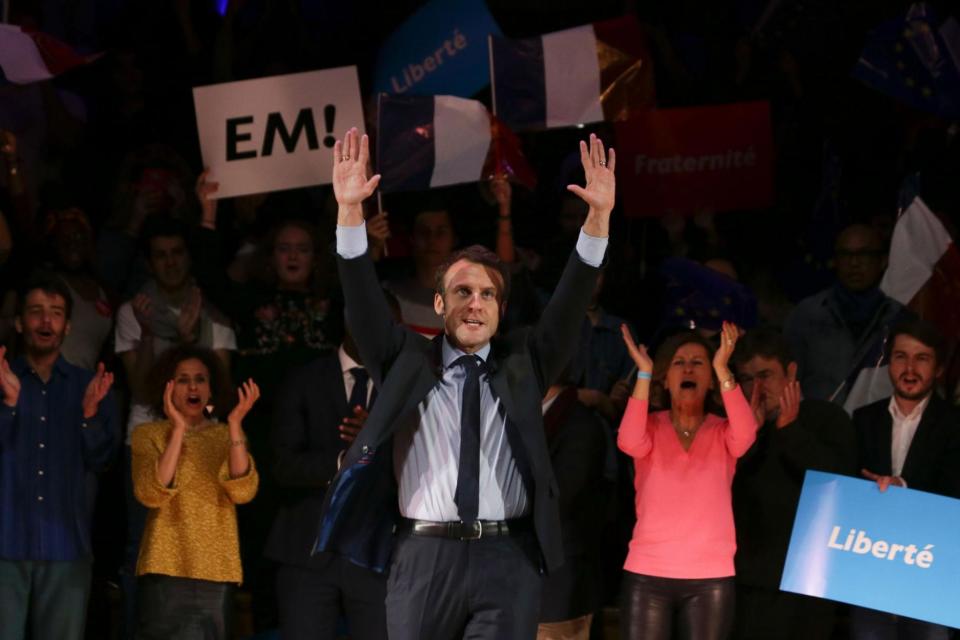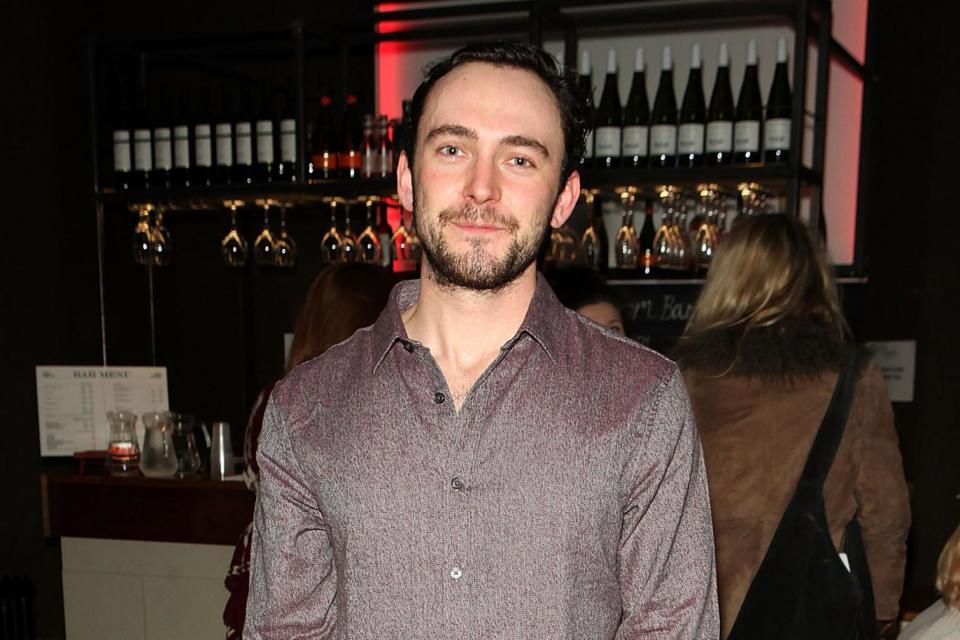How politics and education are bringing the UK and France closer together

It is 5.35pm and the queue at Westminster’s Central Hall snakes around the block, several people deep. The doors opened five minutes ago. It’s teeming but orderly and populated by sedate, polished expatriate Frenchmen and women — businessmen, students, soignée middle-aged women — who are waiting to hear Socialist presidential candidate Emmanuel Macron address the crowd.
Macron is the handsome 39-year-old former banker who appeals largely on the grounds of his relative novelty and dynamism. He split from President Hollande’s Socialist Party to form his own, En Marche (“On the Move”), and is riding a growing wave of popularity. While Marine Le Pen is leading first-round polls, with two months to go until the election Macron is currently on course to defeat the Front National leader by 58 per cent to 42 per cent in the crucial second round. His wife, Brigitte Trogneux, is 24 years his senior. The couple met when she taught him French at La Providence high school in Amiens, and they were married in 2007.
Macron arrived in London yesterday morning and met the Prime Minister in Downing Street, before shooting up to Westminster to deliver his speech. It is not unusual for a French candidate to address Londoners — Hollande and Nicolas Sarkozy both did so. As Boris Johnson famously quipped, by population London is France’s sixth-largest city. Our capital even has its own French MP — Axelle Lemaire, a 42-year-old Socialist Party member based in Kensington. However, organisers say that turnout last night exceeded expectations. “I am surprised by the attendance,” says Guel, a 34-year-old banker who has been working in London for six years and was queuing to watch Macron. “It’s quite impressive.” Moreover, London is significant, he says. “London has always been a bit of a test electoral market,” he continues. “I think the demographic can be representative of the liberal youth.”
“All the significant politicians come to London,” says a fiftysomething Frenchwoman who has lived in Hammersmith for 20 years. “Though I would be interested to know if all the people who are in the queue are actually registered to vote in the UK.”
Oliver, 17, a sixth-form student who will turn 18 in time for the election, has travelled all the way from Birmingham to listen to Macron. “He cares about young people,” he says, “and there’s a personal aspect — he’s young, charismatic and has a lot of energy.”
There’s a separation anxiety among France’s estranged population here. “Obviously we’re not living in France,” says Wuraola, 34, a Macron supporter who has lived in London for 10 years, “but by being outsiders, arguably we have the best view. We’re immigrants to the UK, so we know what that’s like, but we haven’t lost our sense of being French because there’s such a huge community here.” Of 400, 000 French nationals living in the UK, 300,000 live in London.
This is far removed from the style of boisterous, devout rally that Donald Trump has popularised. Many of the voters here were yet to make up their mind. One says firmly that Macron is “definitely not my candidate”; others are cautious of his inexperience in office. However, the numbers here suggest a lively interest in events across the Channel that is more than soft, token nationalism. For French expatriates, the premonitions of Brexit and the choruses of nationalism resounding across Europe add a disquieting dimension to their own election. Macron’s highest-profile opponent, Marine Le Pen, has suggested she will take France out of the economic union if she wins in May. “This election will really show the French position as a European community,” continues Wuraola. “It’s our Brexit. On the one hand you have Macron with his open arms towards Europe; on the other, Marine Le Pen.”

Macron spoke for more than an hour, walking onto the stage to cries of, “Macron, Macron, Macron!” Speaking about his meeting with Theresa May, he said he told the PM that “the execution of Brexit had to be compliant with French interests and the European interest. I don’t want to accept any caveat or any waiver.”
He also hopes to lure some of his expatriates back to Paris from London — as well as Brits. At Downing Street, Macron declared that he wants “banks, talents, researchers, academics” to move to France after Brexit. He has promised “a series of initiatives to get people working here to come to France”.
And it’s a mood shared here. This week, HSBC announced it would likely be dispatching a cohort of bankers to Paris after Brexit, and it was revealed that Oxford University is considering a campus in France.

The relationship between London and France is symbiotic. There is a relationship between the Mayors of Paris and London — Anne Hidalgo visited Sadiq Khan in his first week in office. And London has its own pseudo French villages, complete with large and thriving lycées that feel both very French and entirely a part of London. The most famous is the Lycée Français Charles de Gaulle in South Kensington, which has almost 400 students aged between three and 18. Watching them — and their inscrutable, chic mothers — mill around the school gates before class will make even self-assured Brits feel lumpen and deficient. The lycée teaches predominantly in French, and is one of the most academically successful French schools outside mainland France, though it also offers the option to take British qualifications.
It has three primary-school satellites — in Ealing, Fulham and Clapham — and an associated lycée, the Collège Français Bilingue de Londres. In late 2015, another lycée — the Lycée International de Londres Winston Churchill — opened in Wembley. In turn, if Oxford opens a campus in Paris, it would be the ancient university’s first and only satellite, with French legal status (and therefore access to EU funding). Sharing intellectual resources is as important as the sharing of financial ones.
Indeed, France’s tougher labour laws have traditionally put off London’s fast-and-loose financial sector. However, major banks have begun to flutter their eyelids at the French capital from a pre-Brexit-limbo Britain, with HSBC at the front of the queue. “We will move in about two years’ time when Brexit becomes effective,” chief executive Stuart Gulliver announced last month at the annual meeting of the World Economic Forum, revealing that the bank planned to relocate 1,000 staff responsible for generating around a fifth of its UK-based trading revenue to Paris.
Macron’s is a common theme, with Hidalgo recently hopping over the channel to woo banks, financial technology firms, trumpeting her city’s “digital economy”, its “best engineering schools” and the “biggest start-up campus in the world”, Station F. “I say to the French in London: if you want to come back, you should know that we are ready for you to come back,” Hidalgo said.
Since the referendum, officials in Paris are reported to have written to 4,000 UK-based companies and they report a “growing stream of inquiries” to an English-speaking hotline that offers advice on schooling, housing and a new expat tax regime.
But all is not lost. Jean-Frédéric de Leusse, head of UBS in France, said that French law does not offer major banks the complete flexibility they need in the fast-moving world of high finance and complex trading.
“As the saying goes, it takes three days to fire somebody in London, three months in Switzerland, and three years in Paris,” he said.

So how can London make its French expats feel at home? Anatomically speaking, the best way to the people’s hearts is via the stomach. While London has long flirted with Francophile sensibilities, French restaurants have sprung up like they’re going out of fashion in 2017 (they’re not). Bloomsbury’s Bon Vivant opens this month to satisfy our quotidien raclette, tartines and croissant needs, while in Dulwich La Bonne Bouffe serves snails, confit canard and steak frites.
For the connoisseurs, in January the Four Seasons opened Le Dame de Pic, the first UK restaurant by 47-year-old Anne-Sophie Pic, currently the only French female chef to hold three Michelin stars. The new culinary landmark has already made waves in the capital with its elaborate reworking of the classic French millefeuille, which this paper’s restaurant critic Fay Maschler has called an “admirably pure architectural construct”, as well as little-known wines from the Rhône Valley worth rolling home for.
When we’re not digesting French culture à table, we’re channelling it onto our screens. The lascivious court intrigues of Versailles return for a second season later this year, produced by French TV channel Canal Plus and filmed in France — but starring British actors including Alexander Vlahos and George Blagden, while the cult Netflix political hit Marseilles is also due back soon. Harry Styles, Tom Hardy, and Cillian Murphy star in Dunkirk this July, the highly anticipated war flick from Christopher Nolan. Shot on the French beaches, the film is a co-production between the UK, France and the US, proving we can all get along together just fine after all.

Macron himself says he’s learnt lessons from his British counterparts, firmly setting out his stall last night in the wake of David Cameron’s failure and the Leave campaign’s success. “In the current environment, if you are shy, you are dead,” he says.
And London’s French have not been backwards in coming forward. “He’s hot,” says a student in the queue. “But it is interesting to see that people are engaged — there was for many years a disinterest in politics in France and evidently it’s not the case any more.”
Follow Samuel Fishwick: @fish_o_wick
Follow Phoebe Luckhurst: @phoebeluckhurst

 Yahoo News
Yahoo News 
